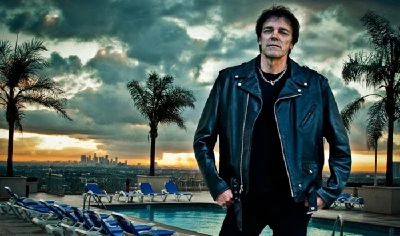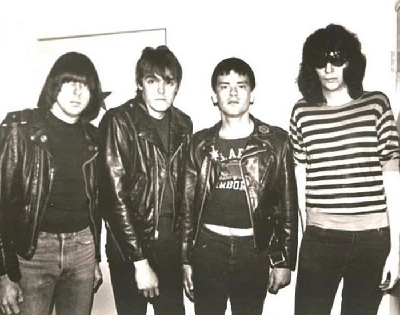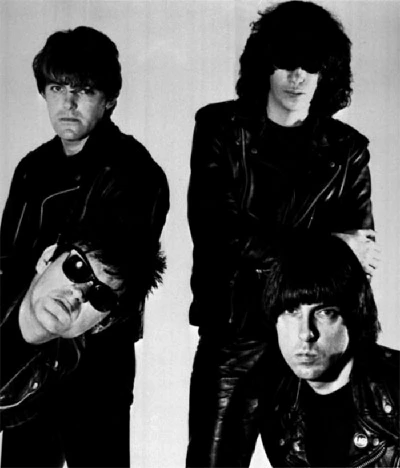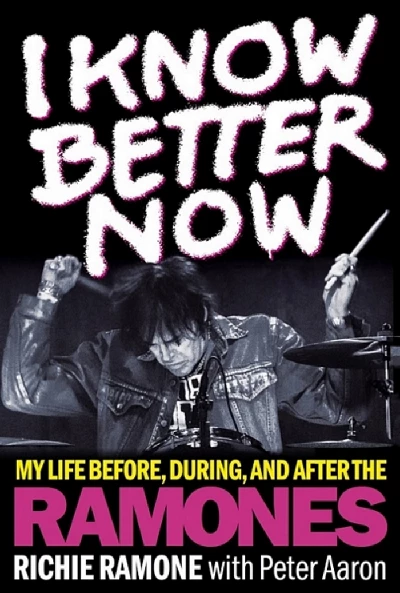published: 14 /
6 /
2019

Denzil Watson speaks to drummer Richie Ramone about life in the Ramones and his new autobiography, 'I Know Better Now'.
Article
Go to the official website of New York punk rock legends The Ramones and click on the 'About' tab and it reads thus: "The four original Ramones deserve full and complete credit for formulating the concept, sound and fashion that had a tremendous impact not only on rock'n'roll, but the world in general." A pretty big statement, but then who hasn't heard of The Ramones? Chances are if you have one of the band's equally famous tee-shirts it'll say "Johnny, Joey, Dee Dee and Tommy" on it. But wait, the website continues: "Though the path had already been cut, these alternative musicians were brought in to help Johnny and Joey continue on, until they chose to retire in 1996."
Aside from CJ Ramone who replaced Dee Dee on bass in 1989, the rest of the list consists of drummers: three to be precise. Elvis Ramone a.k.a. Blondie's drummer Clem Burke is a spurious inclusion and can instantly be discounted: basically he stood-in on drums for two gigs. Second in the list is Marky Ramone who replaced Tommy in 1978. Described as a 'substitute musician', his initial tenure spanned five years, before re-joining for a second stint that lasted nigh on a decade. That leaves Richie Ramone, a.k.a. Richard Reinhardt, who joined the band in 1983 replacing Marky, just after the release of the band's seventh album, 'Subterranean Jungle'. Richie went on to play a number of shows with the band, feature on three of the band's studio albums and contribute a handful of original songs, including cult classic 'Somebody put something in my drink'. Hired-hand or a critical fourth Ramone that kept the Ramones' finely-oiled punk rock machine firing on all cylinders? You could argue that one either way. However, read Richie's recently published book 'I Know Better Now' and you'll probably be inclined to argue for the latter. Pennyblackmusic caught up with Richie Ramone to talk about life before, during and after The Ramones.
PB: I really enjoyed reading your book. Had you been planning on writing a book for a while or did something inspire you to do it recently?
Richie Ramone: No. I really wasn't going to do a book, you know? I thought maybe I'd write a book before I leave this earth. So I never really thought about it. But a literary agent named Lee Sobel contacted me and said I should do a book. And I said "No, I don't want to do a book, and it will have no end", so it swept back and forth for nearly a month. I talked to my friends and they said if you leave it ten years then no-one may be interested, so strike while the iron's hot. So I decided to do the book and it turned out fabulous. It was a large undertaking but it turned out good. So I'm glad I did it. But I wasn't searching to do it.
PB: How did you approach writing it?
RR: I worked with Peter Aaron. He's a musician himself and he grew up in my neck of the woods near New Jersey. I found him to be the perfect writer to write with. Basically I was telling him my story, so the way I wrote this book was via live conversations and tape recordings of telling Peter stories. And then he put it together. It was a lot of work. But that is basically how we did it.
PB: Some of the stuff goes right back to when you were a kid. Could you remember most of that stuff or was it a case of using archives for the stuff you couldn't remember and where you needed dates and details?
RR: Lots of things I remembered. There was lots of Super 8 film. My mother never had a camera but she had a Super 8 film so we had tons of stuff transferred to DVD so we could look at it to see what was going on. You remember certain things but you don't remember everything. That's probably the hardest thing, remembering 30 or 40 years ago, trying to get the facts straight. But you have to depend on friends and other people in the business that may have been there. I wanted to get the dates, the times and the facts all correct. I just didn't want to throw it out there.
PB: Something that comes over very strongly is that from a really early age you had a real passion for drumming and wanted to make a career of it.
RR: Yeah, really did, right from kindergarten. Maybe kids just beat on their chest or whatever when they're young but I was constantly doing it. I was around music because I had my brother Lenny who is five years older than me. And my dad always said "You're five years ahead of your time". So when I was seven I was already living a twelve-year-old boy's life. That's how I got involved in music, really young, and my brother had the records. So by the time I was ten I was a full-blown drummer, playing live.
PB: I really enjoyed your account of your years as a kid growing up. Would you say you were a typical youngster?
RR: Yeah. I was born to a middle-class family. My father was a landscape architect and had his own business and a couple of trucks. He had 12-15 guys working for him. But he was always working and he was pretty strict so I went through a lot of stuff with him, being strict. But my mother was the protector. We always went on vacation every year, so yeah, I'd say I had a wonderful childhood.
PB: I have to say, I didn't know about your triple nipples or your lack of body odour! That latter trait must have been a distinct advantage for a budding drummer!
RR: Yeah. I had this certain gene. Like my armpits would never stink. I could wear a shirt and the shirt never sticks. And I see these drummers who have this can of spray and they get off the show and change their clothes and spray the whole of their upper body with this spray. And I'd look at them and go "Wow!" because I never had to deal with that ever. I've never put on deodorant. It's crazy.
PB: Just reading through the chapters about the years before The Ramones, as soon as you could get out of the house you were out there gigging.
RR: Yeah. I was out there gigging with my brother's band. When they came and rehearsed when he was 15, I'd be 10 and I was already playing live with them in the basement. I learned a lot from their drummer, Eddie Dandy, who was a drummer and a singer. I think that had a big part to do with it, turning out the musician who I am today.
PB: I really enjoyed the account of one of your early bands, Maddison, and your tour of Canada.
RR: I did a lot with my brother, being a horn player. I was exposed to a lot of funk, some of that hard stuff, at a young age. Which was kind of cool as it gave me a different aspect, apart from the rock'n'roll drumming. So I was able to develop all those skills. And when you have those skills you are really able to lock into everything. So I'm a more versatile drummer than a two-handed, heavy beater.
PB: It's ironic that you went to see The Ramones in New Jersey in 1975. Your Maddison bandmates weren't impressed were they?
RR: Yeah, this was something new back in '75 and I was very intrigued by it. Some of my friends were like 'What is this?' and wanted to go and listen to Emerson, Lake and Palmer. So after we left the show I guess that's what we put on in the car. You've got to remember that music was way different back then.
PB: I found the story of Francine, Frankie Vali's daughter, very sad. Especially after he lost one of his other daughters, Celia, six months earlier. I could tell that her tragic passing is still very raw. (Note: Francine Valli died of a drug overdose in August 1980.)
RR: Yeah, it will always touch me and affect me. This talented girl. Just a little too much partying and something stupid that happened caused this. I was always concerned for her as I would always travel and be in New York City. I got Frankie to take her on the road and she was going to start rehearsals but I guess she didn't get on with her dad that much, back and forth with her mother and they finally got a divorce, so it kind of turned sour. Mary Valli told her terrible things about her dad, but then they were getting along and he was going to take her on tour and he was doing very well, back in the late 70s. Then this happened. It was really tragic. Special girl though.
PB: It's interesting that back in the late 70s you were more into British New Wave, like The Buzzcocks, Cure, XTC, Echo and the Bunnymen, rather than the first wave of US punk.
RR: All that sound was very intriguing to me. And that's what really got me into drumming. It's the exact precision that music had, if you listen to the drumming. Not like punk rock which is kind of loose. It was metered and I took that sound into The Ramones. It was like a locomotion, like a train coming down the tracks when I was in that band. It was very, very powerful. When I finally got to New York City in 1980 that was still happening and eventually it just switched over. When I got to New York I was exposed to much more different kinds of music than when I was living in New Jersey.
PB: Would it be fair to say Remod were your first properly creative band?
RR: Yeah, that was my first creative band where we could write and sing. Before that Ambulance with Steve Miller, that was my first punkier type of thing. So probably around '78, '79 was when things started to change for me.
PB: I searched for Remod and had a listen to one of the two tracks you released, "Gay Girls Dance", and it sounds pretty good.
RR: Ain't that good? The drumming and Tak [Deluks] on vocals. He was the crazy Irishman. It was a great time. We had leads in the East Village of New York City in 1979 and 1980. It was just splendid there, before cell phones and texting and all that stuff. It was just great. A great time to grow up. It'll never happen again
PB: Back then there was certainly a lot of sex and drugs to go with the rock'n'roll wasn't there?
RR: Yeah. There always is. But, you know, I've been fortunate enough to know when the party's over. I'm not the kind of guy who goes on a four-day binge. Eventually I go "Hey, I can't get any higher than this right now so I'm going home." Unfortunately I've got a lot of friends and a lot of people who just didn't know when to stop. They just didn't have that thing in them.
PB: The thing with your next band, The Velveteens, where you became session musicians overnight, having been in the band on what you understood to be an equal footing, was a bit of an eye-opener wasn't it? I don’t blame you walking on that one.
RR: I was starting to get my feet wet with original bands playing CBGB's and all kinds of stuff. We were getting exposed to the music industry per se, one-on-one. The labels, the people, the cheats and the dirty side of the business. Before I was playing in covers bands, but then you get into your own stuff and you learn a lot during those years.
PB: They say to make it in the biz you need talent, know people and be in the right place at the right time. That was certainly the case for your encounter with Larry Chek wasn't it? A real sliding doors moment.
RR: Yeah - you gotta be in the right place. We used to hang out at The Shirts' house and I used to date [singer] Annie Golden. But Larry got me in and I'd not met any of them before so I just went in and did the audition.
PB: I really enjoyed your account of the auditions for The Ramones. And I think you hit the nail on the head saying you weren't fazed by it all because you weren't a fanboy and you just went in and concentrated on the drumming.
RR: That's mainly what I did. I was a confident drummer and nothing scared me. Sure, you get goosebumps going in with a band like that, but when it came time to do what I had to do, I blew them away in those auditions. There's no doubt about it.
PB: In the final third of the book your account of being in the band was a real insight into what it was like coming into the band. The three of them were very different characters weren't they?
RR: What do you mean?
PB: Well, you've got Dee Dee who was a bit crazy and wild…
RR: Ah, you mean the brothers, yeah. They were all three of them different, then me the Jersey boy, Bon Jovi in the mix now, four different things going on. Even though these three guys were from Queens [Long Island] and, believe it or not, they all grew up in the same area, they were still individual personalities.
PB: When you see The Ramones they come across as this really tight-knit unit and everyone locks in and there's a 'Ramones way', but off-stage they were really different weren't they?
RR: Yeah, that was where we locked on as a unit, on-stage. Backstage, we'd warm up a half-an-hour before the show so we locked on before we hit the stage. I never hung-out with Johnny ever. We never did anything, not even a coffee. I don't even think I had his number.
PB: I knew about his right-of-centre political leanings but the whole money thing was a bit bizarre.
RR: Yeah, the money thing was bizarre. The whole way it went down I should have had lawyers doing it instead of me. I explain in the book how all this went down and it was a shame. I think that I could have written some more killer songs for them. It was just a shame how it all went down but I've got no regrets with that at all. I don’t look back and go 'Oh no'. You made that decision and you more forward.
PB: I found the account of recording the albums interesting. The one-take rule, the getting stuff done as cheaply and as quickly as possible to conserve money. On one level it's quite punk rock, and on another level it's not.
RR: I think getting it down quick and recording live is quite punk rock. That's how you should make punk rock records. But we got it done. All those records were one take. Sometimes I'd get a second take. Those albums were done in a day-and-a-half. Fourteen or fifteen drum tracks. It was crazy. Ten one day, five another and then I'm done.
PB: In the book you allude to this situation where you were in the band still wondering if you were a "Ramone" or not. That must have been a bit strange.
RR: That's when I got in the band. It was about three months before it was like "Yeah, you're a Ramone". It was like, "Oh yeah, you can start signing yourself as Richie Ramone". You were a Ramone when they wanted you to be a Ramone and you were Richard Reinhardt when they wanted you to be Richard Reinhardt. When I mixed five songs on the album 'Halfway to Sanity' or wanted to buy some merch, that's when it changed.
PB: I found it really strange that you got your name on the famous Ramones tee but didn't get paid anything from the merch.
RR: Yeah. I wasn't asking for much at all. I was just wanting for them to show the love and make me feel part of the team. That's all. I wasn't going to get rich off of that. That was the day that I understood where I stood in that band and what I was contributing. I mean, I only wrote six songs for them and was on the records. A little something would have been a fantastic thing. Like "We appreciate you. You're doing great." Which Dee Dee and Joey were all for, but when I approached Johnny, he was "Nah, that's not happening", and they'd go away with their hands between their legs. That boils down to Johnny. No-one had the balls to stand up to him.
PB: A Johnny being more bothered about how many tee-shirts the band sold, rather than the records.
RR: That's where he was making money. He was making money on the tee-shirts, not the albums. That was a big deal.
PB: It's clear from the book that Johnny's aloofness stopped you forming a real bond with him, but you became really close with Joey didn't you?
RR: Yeah. I was in that band four years and ten months and we were together every night. We were always hanging out, whether we were on the road or in the East Village. We were always out together. It was an exceptional bond and we did a lot of stuff together.
PB: In the book you list all the shows you did with the band. If you had to pick out one show which would it be?
RR: I really can't pick out one. Milton Keynes, some of the festivals we played. 200,000 people was pretty exceptional. The British shows were great. There's too many good shows. You know why? By the time I was in that band they knew what city to go to, what size of venue to be in where they could sell it out. Here - a small town, 800 people, it will sell-out. In a big city, 5,000 people. They had it down. This was night after night. People hanging from the rafters. You never played to an empty room. And we played a lot - maybe 140 or 150 shows a year. That's a lot of playing. They were all amazing shows. Just to be involved with this band. There were so many things I learned from it that I take with me up to today. I can't think of any other band to be in.
PB: Do you find it strange that you came into the band as a non-fan with none of their records, you felt a bit like a hired hand at certain times during your four-or-so-years of tenure, but this time came to define who you now are: Richie Ramone.
RR: Right. I don't really look back at it. It's just the way the cards came out. This was what was supposed to be for me. And that's what happened. It was an exceptional thing because you weren't just in a band, not just the drummer for the band. You became a Ramone. It's a huge thing. I really got fortunate with that.
PB: And it's a pretty elite club isn't it? Aside from the four original members, there's only CJ, Marky and you. And it's an unusual situation with all of the original members having passed on. There's still a massive amount of love for The Ramones out there and I guess you have become this sort of torch-bearer for them, the centre of this love of The Ramones.
RR: I don't know if I'm a torch-bearer or the legacy guy. You know what I'm saying? I'm just doing my thing as a solo artist now so it's not The Ramones, it's something different. If you come to my shows you're going to see some Ramones songs, without a doubt.
PB: Thank you for your time and good luck with the book. I really enjoyed reading it very much.
RR: Thank you. You can tell it's genuine. And that it is important to me. It doesn't look like it's written by someone else. It sounds like me sitting in a bar telling you my life story. I don't know if you've noticed how I speak, in short sentences, but the sentences are short and he [Peter Aaron] got the voice right. It's very important for the writer to get the voice right when you are doing a book like this so it sounds like you. If it sounds like someone else when you are reading it, that's a problem.
PB: Having read the book and hearing your voice now, I can put them both together.
RR: I'd like to read it like that as an audio book. Read it in my voice. That would be kinda fun right?
PB: You've got the voice that people can listen to pretty easily.
RR: OK, cool.
PBM: Richie Ramone, thank you very much for your time.
RR: Great, thanks so much.
Band Links:-
https://www.richieramone.com/
https://www.facebook.com/RichieRamoneO
https://en.wikipedia.org/wiki/Richie_R
Picture Gallery:-


